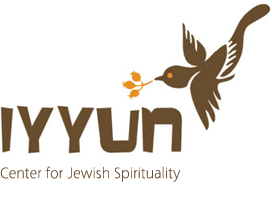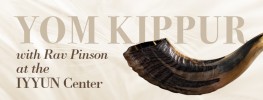Following the demise of the celebrated early nineteenth century Chassidic teacher, R. Moshe of Kubrin, Reb Mendel of Kotzk approached his disciples and requested they eulogize their master; describing what made him so special. “There was no particular area in life that he excelled inâ€, they exclaimed. “Unique, however, was that whatever he was doing at the moment he was completely present.†That which he occupied himself with at any given moment was all that was relevant to him. Whatever he was doing and wherever he was he was fully there.
It is within human nature it seems, that what we acquire easily and without exertion or difficulty is less valuable and exciting to us than that which we work hard to obtain. Clearly, “a person would rather possess a dollar earned than nine dollars granted.†This phenomenon extends beyond the realm of objects and into the dimensions of time and space as well. Except for peak moments the present generally feels less thrilling or even relevant than the past or what the future will bring. Indeed the grass does seem always greener on the other side of the fence.
We tend to look forward in time or even backwards, but the present, that which is the most important part of our reality appears to us the least attractive. We often find ourselves daydreaming, reminiscing or running off in all directions of time as we miss what is transpiring right in front of us. Noticeably, the last place the mind chooses to settle is in the present, as it is restlessly occupied with roaming in the otherness of past or future. Perhaps, to the immature both the future and even the past seem much richer in possibilities than the fleeting present.
When life is unsatisfying in the present comfort is then gained by remembering life as it existed in the past, how exciting it was. Or alternatively, some may resort to the future, how interesting life will become in the future. So many of us are to busy ruminating over the past or planning the manipulation of the future that we are perennially absent in the here and now.
“Those were the days†is a universal cry of the disempowered spirit. This declaration and rumination of the past demonstrates an unwillingness to deal with the present as it is. Equally so is the fascination of what will become of us in the future, whether in an older age or even once we no longer embody physical form. Discussion and certainly preoccupation with the future is a result of the dissatisfaction with life at the moment. When life is meaningful in the present, we will not feel the need to look into the future or back into the past for any form of validation or confirmation.
Mitzvos come to us with the intent of focusing our attention to the here and now so we can be fully aware and present. Mitzvos are designed to ground a person within the dimensions of time – the occurring moment, and space – the immediate surroundings, and than afford him the ability to hollow that immediate. A vast group of present-day Mitzvos pertain to mundane human activities, such as, how, what, and when to eat, sleep, or do business. Essentially the Torah is an all comprehensive divine code with invitations in the form of instructions on how we ought to live life, with all its minutiae in a spiritual and appropriate manner; aspiring to teach us how to celebrate and fully experience life nobly and compassionately and with a divine expansiveness.
All human activities from the more refined such as love to the presumably insignificant such as tying shoes are all included in the infinite embrace of Torah. The Torah’s ambition is to elevate the seemingly ordinary present into something extraordinary; transforming the natural into the miraculous and the everyday into the unique.
A human being doesn’t need to live life and perform Mitzvos with a sense of nostalgia, or, for that matter so that they will be rewarded and not punished in the future. Rather, Mitzvos are aimed to ground the doer in the experience, and ultimately glorify the present and its creator. The essence of the Torah experience is to be rooted in the here and now. With each Mitzvah done the doer brings to awareness the immediacy of the present moment. To live in the present means to live mindfully, openly, and with awareness of the creator’s immediate presence. With this awesome awareness in mind we transform a simple mundane action performed in a seemingly simple non distinct moment, into a hallowed action and elevated experience as the Mitzvot are the strings of connections.
A prisoner, in the sixteenth century who was incarcerated for life was given a unique choice; one day of the year he was allowed to act life a free man and practice Torah as he desired. This presented him with a great dilemma. Being a devout practicing Jew, he did not know which day of the year to choose so that he could perform the optimum, whether in quantity or quality measure of Mitzvos. Should he choose the first day possible, or should he wait for Shabbat, so that he could recite the kidush, pray an extra prayer. Perhaps he should wait until Rosh Hashanah – the day commencing the new year? Or better yet the holiest day of the year, Yom Kippur, the day of atonement.? Unable to reach a decision, he sent letters to the leading sages to seek their counsel.
Some time later one of the prominent Rabbi’s of medieval Europe responded with the instruct to choose the first opportunity that presented itself, be it Shabbat, weekday, holiday, whatever day of the week and year was not relevant. He should choose the first opportunity that was made available for him to be free and perform Mitzvos.
The most important and valued time is the present, and the moment that presents itself immediately in front of us is the most consequential. To return to the present is to be in contact with life itself and with its creator. One of God’s sobriquets is hamakom – The Place, perhaps the inference is that being here/now provides the greatest potential for spiritual connection and growth.
Hashem/ the name of God, the ineffable, traditionally called the Tetragrammaton is made up of four Hebrew letters, yud –  hei – vav – hei.  This essential name can be read as, yud hoveh- the yud in the hoveh; hoveh in Hebrew meaning the present. Yud is the point, the beginning that encompasses all further articulation. For this reason every Hebrew letter begins with the small yud, and than later the flow expands into various horizontal or vertical directions to formulate other formations of letters. As yud is the point, the point is in the now, in the hoveh, in the present, what is here right here, right now.
The intention of performing good and noble deeds should not be for the attainment of rewards in an after life, nor, should one feel that life is being lived to rectify that which has been done in a previous incarnation. What occurred in previous lives is often of no importance, nor is it imperative for our mental or spiritual wellbeing to know what will become of us in a future world, what is extremely relevant is Today. Any diversion of attention into the future or the past is a stolen moment from the extraordinary opportunity to live life in the present, and to make each moment special and worthwhile.
Teshuvah is precisely about this awesome dimension which we know as the present, reprogramming the present and thus transforming past and future. It is the empowerment of the present as it stands unrelated to past behaviors and experiences, and to a degree non contingent on what will happen in the future. It is about Now. Only by being fully in the now can we birth ourselves anew, and do so at any moment, otherwise we become limited by our past, and a slave to a fixed self image without the possibility for any real change.
The present, in fact, is a great anomaly. Whereas all there is the now, it is so fleeting that it is difficult to acknowledge being in it. Still, strictly and logically speaking one cannot go into the past or the future, even if theoretically it were possible because once in that place it would be occurring in our present. Arguably, the past and the future do not exist in reality, they are but fragments of memory or imagination.
To ‘do’ teshuvah, or better yet, to be in a state of teshuvah one is required detach oneself from past experiences and view the present as the sole reality. The one who desires to journey on the path of teshuvah needs be totally in the eternal moment, and fully present and aware. For this reason feelings of imprisonment because the past or the gravity of the future ought to be relinquished, if not disregarded completely.
When garments are dirtied with mud it is best to wait a short time until the mud has dried and only then attempt to scrub it off. Similarly, when a human being does some soul searching and begins to acknowledge past mishaps, the initial reaction is to immediately get involved and seek to mend that which has been done, yet, this is not necessarily the wisest solution. In such proximity to the deed any involvement with the deed as such, even with intentions of rectification, may cause more damage which in turn will then require further repair. Often the best course of initial action and reaction is to disregard the past and view the present as a new and fresh beginning.
The power of today translates as boundless and inexhaustible measures for renewed growth and opportunity. Through teshuvah we have the amazing ability to release ourselves from the impressions of the past, and untangle ourselves from the quasi-automatic causality curtailing the apparent immutability of determinism. What’s more, by training to relate to life and the self as it exists in the present – sans the baggage and preconceived notions of the past- more of life, and consequently more of oneself becomes available to the person and to others. What we have is the present, the past is history the future is yet to come, and the present is indeed a present, a gift of sort that offers us a new lease on life, and the hope to begin anew.
(The above is an excerpt from Rav DovBer Pinson’s forthcoming book titled “Reclaiming the Self: The Path of Teshuvah. All rights reserved.)







